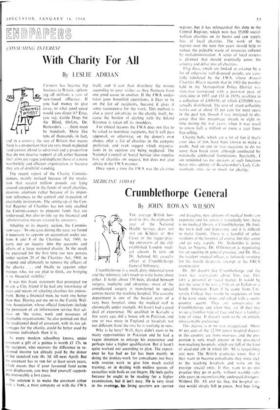p8puo
CONSUMING INTEREST
With Charity For All
By LESLIE ADRIAN
The recent report of the Charity Commis- sioners, mainly noticed because of the revela- tion that several million pounds are lying around unapplied in the funds of small charities, deserves attention rather because of its impor- tant references to the control and inspection of charitable institutions. The setting-up of the Cen- tral Register of Charities has not only enabled the Commissioners to pinpoint funds that are tinder-used, but also to tidy up the financial and ddministrative messes created by amateurs.
Alluding to its inquiry section, the Commis- sion says: 'In one case during the year, we found it necessary to appoint an accountant under sec- tions 6 and 8 of the Charities Act, 1960. to carry out an inquiry into the accounts and affairs of a large national charity. In the result ske exercised for the first time our new powers under section 20 of the Charities Act, 1960. to suspend and ultimately to remove the officers of the charity . . . and finally to appoint other trustees who, we are glad to think, are bringing It to financial stability.'
It was this frank statement that prompted me to ask a City friend if he had any knowledge of ways and means of selecting charities for endow- ment. Being a financial man, he went one better than that. Having put me on to the Family Wel- tare Association, whose official functions include the provision of an information service that ad- ■ ises on 'the status, work and resources of charitable organisations,' he also pointed out that he traditional deed of covenant, with its tax ad- ‘antages for the charity, could be better used by Lcnerous individuals than it is.
Ns every modern schoolboy knows, under covenant a gift of a guinea is worth fl 17s. to the recipient, who recovers the difference in re- claimed income tax already paid by the donor at the standard rate (8s. 3d. till next April). But the covenant has to run for at least seven years, ithich means that if your favoured fund earns Your displeasure; you may find yourself support- ing irrevocably a lost cause.
The solution is to make the covenant either uith a bank, a trust company or with the FWA itself, and it can then distribute the money according to your wishes as they fluctuate from one good cause to another. If the FWA under- takes your bountiful operations, it likes to be on the list of recipients, because it gives it some recompense for the work. This method is also a great advantage to the charity itself, be- cause the burden of dealing with the Inland Revenue is taken off its shoulders.
For ethical reasons the FWA does not like to be asked to nominate recipients, but it will pass approval, or otherwise, on the donor's own choice, offer a list of charities in the category preferred, and even suggest which organisa- tions in its opinion are being neglected. The National Council of Social Service also supplies lists of charities on request, but does not give advice in the FWA manner.
Once upon a time the FWA was the charities register, but it has relinquished this duty to the Central Register, which now has 55,000 social- welfare charities on its books and can supply lists of local charities. The work of the register over the next few years should help to reduce the palpable waste of resources suffered by maladministration. A series of local reviews is planned that should eventually cover the country and delve into all charities.
Flag days, which are looked at askance by a lot of °them ice well-disposed people, are care- fully tabulated by the EWA. whose Annual Charities Digest records that in 1963 the number held in the Metropolitan Police District Was sixty-two (compared with a post-war peak of sixty-nine in 1957 and 133 in 1935), resulting in a collection of £409.681, of which £350,080 was actually distributed. 1 he cost of street collecting works out at about 15 per cent for most years in the past ten, though I was intrigued to dis- cover that this percentage shrank to eight or nine during the war years, when it was usual to amass half a million or more a year from flag-selling.
Charity balls. which are a lot of fun if that's your idea of fun, have been known to make a profit. And on one or two occasions to do no more than break even, although conducted by nationally celebrated foundations. Inevitably, I am reminded las the speaker: at such functions never miss adding) of Beachcomber's Lady Cab- stanleigh. who ate so much for charity.


































 Previous page
Previous page